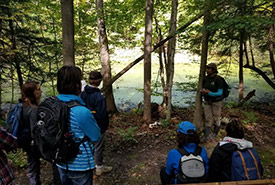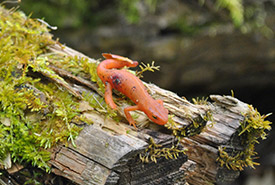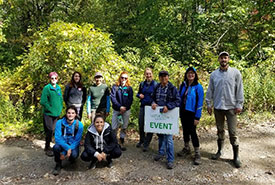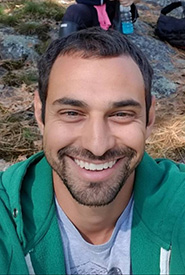Volunteer to learn

A lesson on vernal pools by Jenna Siu (Photo by Daniel Abdelmassih)
On September 29, 2018, I participated in my first Nature Conservancy of Canada (NCC) Conservation Volunteers event. We planted 175 early succession native trees (i.e., trees typically found in young forests) in Happy Valley Forest to help take back a section that was once an invasive black locust plantation. During the event, I and the other volunteers learned a great deal, and that’s what I would like to talk about — the educational value of volunteering and, more specifically, volunteering with NCC.
Volunteering is a great way to help your community, by providing your time to accomplish something of value. Volunteering also has the great personal benefit of providing us with valuable knowledge that we can use to further enhance others’ lives as well as our own.
When volunteering with NCC, or any other organization, you usually go through a mini-lesson at the start of each event, and this is where the education begins.
Related blog posts
At the start of the tree planting event, we had a quick little lesson on the process of digging a hole and planting a tree. Although this may seem like a simple task, to some it may be completely foreign. Even just a small lesson like this, coupled with planting trees for the rest of the day, can give you the confidence to take on a tree planting project at home.
As many of you may know, being able to complete projects yourself provides great satisfaction and a sense of self-worth, not to mention the money saved by doing it yourself.

Red eft in Happy Valley Forest (Photo by NCC)
After the tree planting was finished, we took a guided hike of the property, where we learned more about the types of trees we had planted. We had the chance to see mature versions of most of the species we planted and learned some interesting facts about each of them. We were also lucky enough to see some wildlife, such as red efts and some birds, and learn some cool facts about them as well.
When we stopped to learn about each tree, it was awesome to see people’s faces intrigued by some of these facts. Though much of that information may eventually be forgotten, there will hopefully be something that sticks with each person.

Volunteers and NCC staff after the Conservation Volunteers event (Photo by Daniel Abdelmassih)
These little tidbits of knowledge can be extremely valuable, as they can create a greater appreciation for the natural world. I think that is so important, especially in a time when nature appreciation seems to be dwindling. We need more people to appreciate nature so that we can learn to stop destroying it.
I just want to leave you with a thought I had while hiking and talking with Jenna Siu, a conservation biology coordinator with NCC’s Ontario Region: one of the most beautiful things about working with plants and nature is that no matter how much knowledge you have, there is always something more to learn. Nature is constantly changing and creating new information, and there is also such an enormous amount of information out there that even if you were to work with nature for your entire life, you would still have more to learn. So, get out there and volunteer, especially in nature, and enjoy life-long learning.


